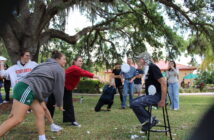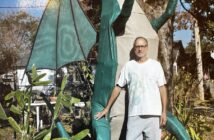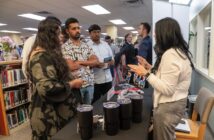
Nothing brings people together as much as great tragedy.
Fourteen years ago, such a tragedy took place, as almost 3000 lives were lost in the Sept. 11 attacks. The days and weeks that followed were the stage for innumerable acts of brotherhood and heroism from Americans, not just in New York City, but across the nation. People banded together to mourn those who were lost, to repair the damage done, and to attempt to figure out how to move forward.
Saint Leo University’s current president, Dr. William J. Lennox Jr., was the superintendent of the United States Military Academy, or West Point, at the time of the attacks, and had a firsthand experience with the panic and chaos that followed.
“I had been superintendent for about as long as I’ve been superintendent here right now. So it was about a little more than two months in, and I was just getting to know the place,” said Lennox. “I was in my office, and I remember my secretary saying ‘something just happened down in New York City, that a plane hit one of the towers.’ So I turned on a tv and just about that time the second plane hit and immediately I thought ‘hey that’s not a coincidence, something’s going on.”
After the initial shock of the attack, Lennox, and others, began to check with the Army and other departments to see if they could determine what happened. He quickly began taking procedures to protect his students, shutting down the school. There was some difficulty as some of the cadets wanted to be able to assist those affected by the attacks.
“One of the big challenges I had was: a number of the cadets started wanting to leave and immediately join the army and do whatever they were going to do,” said Lennox. “The first talk I had with the core of cadets was when all 4000 were eating in the mess hall, the dining facility, I had to just tell them settle down, tactical patience, that they’d all have their turn and unbeknownst to me that they all would have their turn later on, some of those young men and women have been deployed overseas 3 and 4 years, they’ve really seen a lot. I’m really proud of the group that was there and the following groups that have done so much over the last few years.”
Along with responding to the attacks, Lennox had to responsibility of comforting and consoling those who lost loved ones. He also had to try to track down the various cadets that were in the city when it was attacked, and in the Pentagon.
“One of the first things we had to do was check to see if anybody had lost anybody. At that time, I think there were no parents, but some of the relatives. Subsequently, we did have a cadet, maybe cadets come in that had lost parents in the Twin Towers,” said Lennox.
In the days following the attacks, Lennox was met with a large amount of requests from his students to go and assist in the efforts in the city.
“The cadets also wanted to participate. They volunteered to go down and work through the rubble and help clean up. I had to hold some of them back from that because they were students, they had to go to class and everything else,” said Lennox.
Even when dealing with all of this chaos, it was also necessary to focus on what areas might be future targets, and what areas should be protected and have heightened security. During some military raids, it was found that West Point, and various other locations, were on a list of high priority targets.
“We all took precautions, we literally closed the gates. Earlier we had 2 million visitors a year come to west point, and the gates were open, people would just flock in to see the academy,” said Lennox.
Even though it has been over a decade since the September 11th attacks, it is still vitally important that Americans remember this tragedy. It is still an event to be learned from, both in regards to national security, and in how unexpectedly life can be turned on its head. Even though much time has passed, people should still keep a memory of this tragedy in the backs of their heads, so that it will not be repeated.
“I think it’s important [to remember the attacks]for a number of reasons. I think, number one, it was such a tragedy, such an amazing tragedy that I think if you’ve been to New York City now and seen what they’ve done I think it’s very appropriate. It’s understated, but at the same time it’s so impressive, and I think that that is a good way to tell that story,” said Lennox; “About 1 percent of the American population has been fighting [overseas]and we all have a tendency to forget about that too, so it’s a good chance to remember that there are still people over there, in Afghanistan and Iraq and a lot of them have been over there for years, on and off. It has an impact on them, it has an impact on their families, and it’s a good time to remember them too.”
The tragic beauty of the Sept. 11 attacks is that they showed how quickly people, Americans, will band together to help one another. Within minutes of the attacks people were scrambling to find ways to save those who were trapped. Firefighters, police, and even pedestrians were trying to help people, even amongst all the panic and destruction. So while the memory of September 11th will always be clouded by the death and tragedy that took place, it can also be a symbol of human cooperation.
“This is a day we can all gather together, and just remember what happened, and remember that we’re one nation, and we’re a great nation, we’ve done so much over the years. Sometimes we think too much on the negative side of America, but just think what we’ve done and the people we’ve helped in other nations, and it’s a good day to just pause and think about all of us as brothers and sisters in this enterprise we call the United States,” said Lennox.




